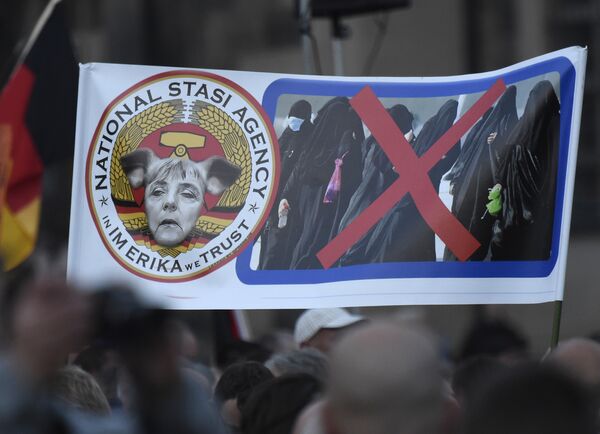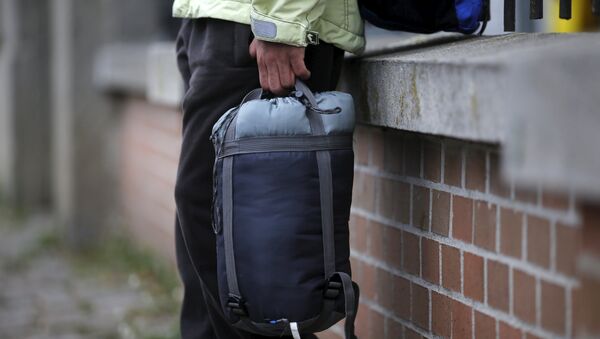Austrian Interior Minister Johanna Mikl-Leitner made the comments following a visit to Spielfeld in Austria's Styria region, which has seen the arrival of thousands of migrants, who are placing enormous pressure on local services.
Yesterday police were forced to remove barricades at a refugee camp in the town, which has a population of only 1,000, to allow for more people to stay in an expanded area.
Austria Minister of the Interior, Johanna Mikl-Leitner, 9/24/2015 #refugeecrisis #refugeeswelcome #ministerofawsome pic.twitter.com/KUbquRr7Wy
— manuell (@TheManuell) September 24, 2015
The situation in Austria has also been experienced by Slovenia, where more than 12,000 new arrivals have entered the country over a 24-hour period, surpassing the numbers passing into Hungary at the height of the crisis in September.
Slovenian officials have called on the EU for support as it struggles to control the influx of people who entered the country following Croatia's decision to open their borders at the end of last week.
Latest @EU_Eurostat show that over 750,000 people have claimed asylum in EU so far this year. Only around 15,000 claims made in UK Jan-June.
— Refugee Council (@refugeecouncil) October 23, 2015
The increasing strain placed on countries within the so-called Balkan route has led Austria's Johanna Mikl-Leitner to call for the EU to control its external borders if a solution to the current situation isn't agreed upon soon.
Germany Tightening Borders
As local authorities continue to struggle with the mass influx of people, Austria's police chief Josef Klamminger told broadcaster ORF that the reason for the backlog of refugees and migrants in Austria and Slovenia is due to German efforts to secure its own borders.
"Germany's restrictions are now affecting Austria and the entire Balkan route, and we are left in a kind of sandwich position."
Germany's efforts to stem the flow of refugees and migrants into the country comes as new asylum laws are reportedly set to be introduced one week earlier than originally planned.
Time for all to take responsibility and start delivering & cooperating. My speech today in #Slovenia #refugeecrisis https://t.co/VgpZ4VCyO9
— DimitrisAvramopoulos (@Avramopoulos) October 22, 2015
Under the new laws, to be implemented on Sunday, authorities will be given power to speed up the process of sending back migrants whose asylum applications have been rejected.
Other measures include tightening the regulations in regards to asylum eligibility and cutting the costs of service delivered to those who have not been granted asylum.

It's thought that the German government is under pressure to clamp down on the number of refugees in the country, with many local authorities struggling to accommodate the unprecedented influx of people, estimated to reach up to 1.5 million this year.
Recent Events Shows Refugee Backlash
The actions of certain countries tightening their borders in recent times resembles somewhat of a backlash against earlier calls for refugees to be allowed to freely enter EU states and claim asylum.
Commentators have noted that after a period of goodwill, many states are becoming fed up with the lack of action across the bloc and are starting to buckle under the pressure placed on local authorities, witnessed through Germany and Austria's tightening of borders.
There are now more than 4 million Syrian #refugees worldwide. Over 2 million of them are being hosted by Turkey alone. #refugeecrisis
— Refugee Action (@RefugeeAction) October 23, 2015
In order to try and address the situation along the so-called Balkan route, European Commission President Jean-Claude Juncker has called an extraordinary meeting with leaders from Austria, Bulgaria, Croatia, Macedonia, Germany, Greece, Hungary, Romania, Serbia and Slovenia to discuss what can be done to stem refugee flows.
I commend #Slovenia for its continuous demonstration of responsibility to the #EU rules. pic.twitter.com/DFQXR6fNUJ
— DimitrisAvramopoulos (@Avramopoulos) October 22, 2015
There is also heavy criticism of the EU as a whole for failing to come up with a universal immigration policy or course of action over refugees, with wide differences in opinion between various EU countries.


